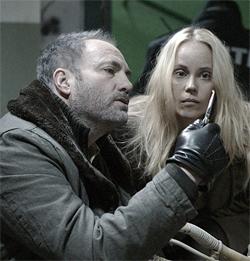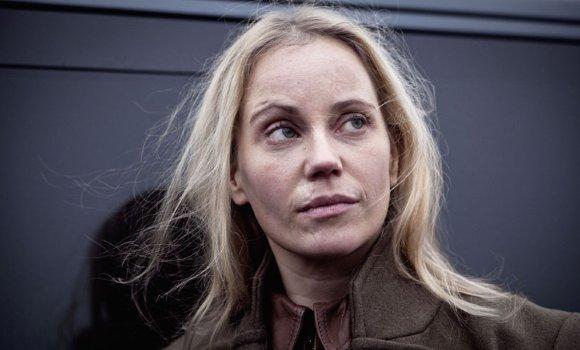[From across the pond, and one of our newest contributors, comes this enticing report about one of the best new shows the U.S. hasn't seen — yet. It's a report from Janet McCabe, a British TV author and scholar who, with equally passionate and well-informed colleague Kim Akass, has joined TVWW to let us know what's happening on that side of the Atlantic.
Their official joint column, a bit of shared real estate for dispatches from the U.K., begins with this view from The Bridge, a new Scandinavian series that sounds fantastic. So when and where can Americans see it? For a first taste, how about here — and now? Keep reading...
Meanwhile, welcome, Janet and Kim. We're happy, and honored, to have you aboard! Readers beware, however: This story contains lots and lots of umlauts. - DB]By Janet McCabe"Meet the New Sarah Lund!" announced the front cover of the
Radio Times. "Yes, please," I say. After endless Saturday nights without any imported subtitled Scandinavian crime dramas to fill the void comes BBC Four’s latest offering,
The Bridge (or, Bron/Broen), a co-production between Denmark and Sweden. Yes, it’s true. Those nations responsible for
The Killing and
Wallander are working together. Be still my beating heart.
The bridge in question is the Øresund (or Öresund) Bridge, which traverses the straits between Denmark and Sweden. The series opens with the grisly discovery of a female cadaver sliced in half, slap in the middle of bridge, one each side of the Danish-Swedish border. Technically, halfway (because of a tunnel leading onto the bridge) is inside Swedish territory. But in literally shifting the border we have a TV series that challenges the familiar and provides a transnational answer to the limits of local production.
Opened in 2000, Øresund Bridge (locally named Øresundsbron, apparently a mixture that is neither Swedish nor Danish) connects Copenhagen with the city Malmö in the Skane region of Sweden. As the credit sequence takes us over the five-mile bridge, cut with images from the respective cities (the Torso Tower and Windmill in Malmö; the Little Mermaid in Copenhagen), and accompanied to the hauntingly dark "Hollow Talk." sung by Denmark’s leading musical group, Choir of the Young Believers, a list of co-producing European companies appear on screen.
This regional inventory flows as the camera travels along the bridge, from a local to transnational and into another national context: Filmlance International. It reminds us of how these two small nations, after centuries of political conflict and antagonism, are joining forces as a pragmatic solution to secure funding for high-quality, original television at a time when Danish television is fast gaining an international reputation for gripping TV drama. Just as the bridge allows for cross-border traffic and trade, literally reshaping the environment (with the artificial island of Peberholm, existing as a transnational space in middle of the straits), series like The Bridge are traveling far beyond national TV boundaries and reimaging the crime thriller and renewing the genre as a consequence.

It soon transpires that the corpse is not one person but two people, the torso belongs to a prominent Malmö city councilor, and the bottom half a prostitute from Copenhagen who went missing over a year ago.
The Bridge, similar to other Nordic noirs, advocates a very Scandinavian approach to politics and social justice. Starting with the Martin Beck series, created in 1965 by two Swedish writers from the political left Maj Sjöwall and Per Wahlöö, Scandinavian crime fiction interwove realism with a radical political agenda as it critiqued its societies and welfare state.
Modern crime writers like Henning Mankell continue in the Beck tradition and Steig Larsson has succeeded in stimulating precisely the kind of debate that Sjöwall and Wahlöö anticipated.
The Bridge also takes social-political debate as its theme with the police pitched against a highly efficient serial killer who wants to draw attention to how Danish and Swedish society neglects its weak and most susceptible citizens. In a twisted logic, the killer perpetuates the most gruesome, often dreadfully strung-out murders on those same vulnerable individuals, including the homeless and mentally ill. This is murder with a social conscious.
The divided crime scene also means that responsibility falls under two jurisdictions and brings together the latest detective duo, the brilliant but emotionally disconnected Swedish Saga Norén (Sofia Helin) and the laid-back, rather shambolic Danish Martin Rohde (Kim Bodnia). Cultural stereotypes and misunderstandings promptly ensue. Including some linguistic confusion over the same word with different meanings (otherwise known as false friends). A misinterpretation of ‘Frokost’ (Danish for ‘lunch’) and Frukost (Swedish for ‘breakfast’) leads Rohde to make a bad food choice. Hilarious. Who knew?
Like a lot of modern Scandinavian crime fiction including the Millennium trilogy and Miss Smilla’s Feeling for Snow (1992), The Bridge has a psychologically complex, bold and intriguing female investigator who forms the cornerstone of its story that simmers, startles and slowly unravels. There is something awfully familiar about her. Like Smilla Jaspersen and Lisbeth Salander, Norén is more than a little odd. But I find something rather intriguing about this fictional epidemic of women somewhere on the autistic spectrum.

It seems to me that giving Norén an Asperger personality frees her from the normal rules governing gendered behaviours and perceptions. Norén needs rules, and what’s more she keeps to them. Yet in her lack of social skills and emotional empathy (and conveyed in her speech which is almost dialect-less) means Norén can somehow circumvent social conventions dictating a female sense of self. In societies where women do enjoy equality, then, why does such a character exist who needs this kind of personality in order to function and do her job so incredibly well?